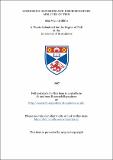Schooling decisions and discriminatory abilities of fish
Abstract
The aim of this thesis has been to investigate the individual decision making abilities of schooling fish in order to understand the composition of fish schools. Do individuals choose particular school-mates, and if so, on what basis are these decisions made? The null hypothesis, that schools are composed of random assortments of individual fish, has been rejected. School membership and structure are profoundly affected by the cognitive abilities and partner choice decisions of fish. Field work carried out in Trinidad and Dorset, UK (on guppies, Poecilia reticulata, and European minnows, Phoxinus phoxinus, respectively) has demonstrated that familiarity does indeed influence choice of schooling partner. Individual guppies under laboratory conditions and in the wild recognise and prefer school-mates with whom they are familiar, and schools of minnows are composed of a significant proportion of individuals which are familiar to one another. Preference for familiar conspecifics develops gradually (over at least 12 days in the case of guppies) and observations of wild guppies shows that this schooling preference is mediated by group size. Tendency to school with familiar fish is strong when group size is small, but declines thereafter, no preference being made as group size increases beyond ~40 individual females. The effect of group size on these partner choice decisions suggests that individual recognition may be possible. Intriguingly, a gender difference in the partner choice decisions of guppy schools in the wild has also been identified. Females spend more time schooling with individuals from their natural schools than males. This has important evolutionary consequences in terms of population differentiation and speciation. It seems, therefore, that schools are by no means composed of a random assortment of individuals. Indeed school structure and membership are profoundly affected by the remarkable discriminatory abilities of individual fish.
Type
Thesis, PhD Doctor of Philosophy
Collections
Items in the St Andrews Research Repository are protected by copyright, with all rights reserved, unless otherwise indicated.

